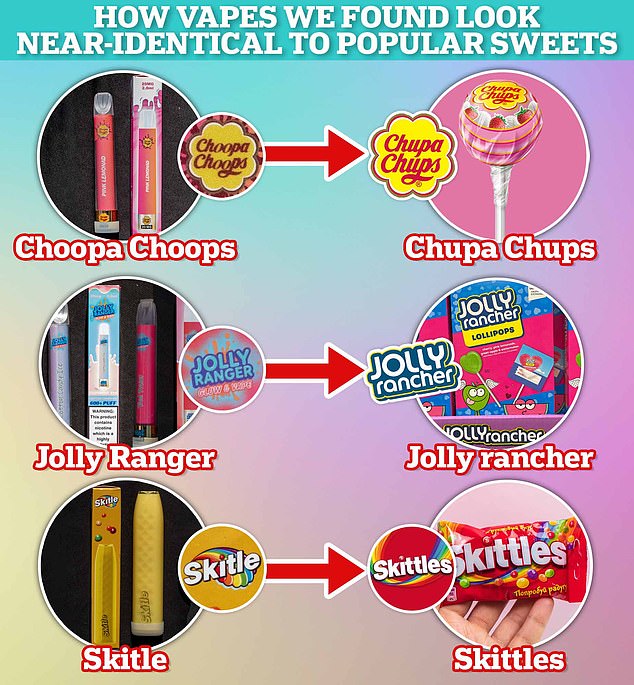Britain’s largest doctors’ union has today called for a blanket ban on all flavoured vapes in a bid to tackle the country’s e-cigarette “epidemic”.
The British Medical Association (BMA) argued that the government must take “bold and courageous action” to protect children and the environment from harm.
Figures show that regular vaping among children and young people has increased almost sixfold in the last decade.
The BMA report, ‘Taking our breath away: why we need tighter regulation of vapes’, attributes the rise to the ‘wide availability of disposable vapes’.
As part of a “vital measure”, it also wants ministers to ban all images, colours and branding on vapes and their packaging, similar to existing rules for cigarettes.
A shocking MailOnline investigation last year even uncovered vapes that looked like candy and brick-and-mortar stores selling the devices alongside chocolates and fruit gummies.

Activists have long blamed predatory manufacturers for the growing crisis, alleging they are intentionally luring children with colorful packaging — unlike highlighters — and kid-friendly flavors like bubblegum and cotton candy.
Products should also be kept out of sight, behind the counter, the BMA adds.
Former Prime Minister Rishi Sunak introduced the Tobacco and E-cigarettes Bill earlier this year, which included plans to ban disposable e-cigarettes and introduce restrictions on flavours and packaging.
However, the project was shelved after the general elections were announced in May.
Prime Minister Sir Keir Starmer revived the bill following Labour’s victory in the July 4 vote, although details of what measures would be included in the proposed legislation have yet to be published.
Dr Penelope Toff, chair of the BMA’s public health medicine committee, called on the current government to “go even further” than the plans outlined by Mr Sunak.
She described the BMA report as a “blueprint” for actions ministers should take.
Calls for a ban on the sale of disposable vapes “due to their disproportionate and harmful use by children and young people and their negative impact on the environment.”
Dr Toff warned that e-cigarette use among young people is a “serious threat to public health”.
“We call on ministers to take bold and courageous action that will make a real difference, such as banning all vaping flavours except tobacco, so that these products are freed from the hold they have on our children and young people, while ensuring they remain an option to help some people quit smoking,” she said.
The BMA wants tougher regulations to tackle the illegal sale of vapes, including government-funded education campaigns, as well as measures to stop the sale of other products, such as nicotine pouches, to young people.
The charity Action on Smoking and Health (Ash) estimates that 18 per cent of 11- to 17-year-olds in Britain (or around 980,000 young people) will have vaped by 2024.
Currently, about 7.6 percent of 11- to 17-year-olds vape regularly or occasionally, up from 1.3 percent in 2014.
Professor David Strain, chair of the BMA’s scientific council, said: ‘There is no denying that we are living through a vaping epidemic.
‘E-cigarette use has increased dramatically over the past decade, with one in ten adults now vaping.
‘However, much more worrying is the increase in young people vaping: there are now almost six times as many young people aged between 11 and 17 vaping compared to 10 years ago.
‘As a doctor, I understand the role that vaping can play in helping people quit smoking, but they have no legitimate place in the lives of our children and young people and when it comes to protecting their health, we cannot afford to take any chances.
‘An industry that so clearly targets children with colours, flavours and branding to promote a product that can lead to nicotine addiction and potential additional harm cannot be allowed to continue.
‘And with two vapes thrown away every second in the UK, the environmental impact of this epidemic is disastrous.’
The World Health Organization has declared vaping harmful.

Kyla Blight, a 17-year-old student who had been vaping since she was 15, made headlines after being rushed to hospital with a collapsed lung.
The devices can lead to nicotine addiction, which has the potential to cause health problems such as high blood pressure and chronic lung disease.
Some e-cigarettes have been found to contain other harmful substances, such as lead and synthetic drugs.
A Department of Health and Social Care spokesman said: ‘The marketing of vapes to children and young people is absolutely unacceptable.
‘Vapes can be an effective way for adult smokers to quit, but we have always been clear that children and non-smoking adults should never vape.
‘The Tobacco and E-Cigarette Bill will prevent e-cigarettes from being deliberately labelled and advertised to attract children, including regulating flavours, packaging and changing how and where they are displayed in stores.’

